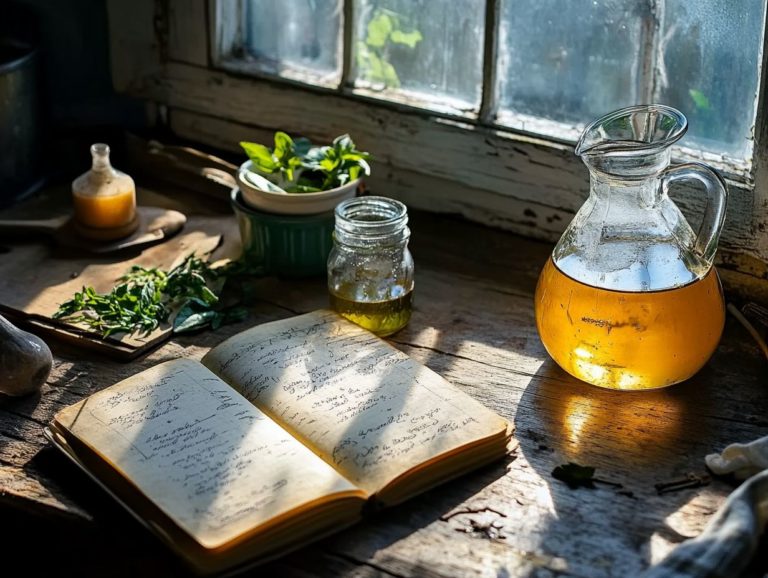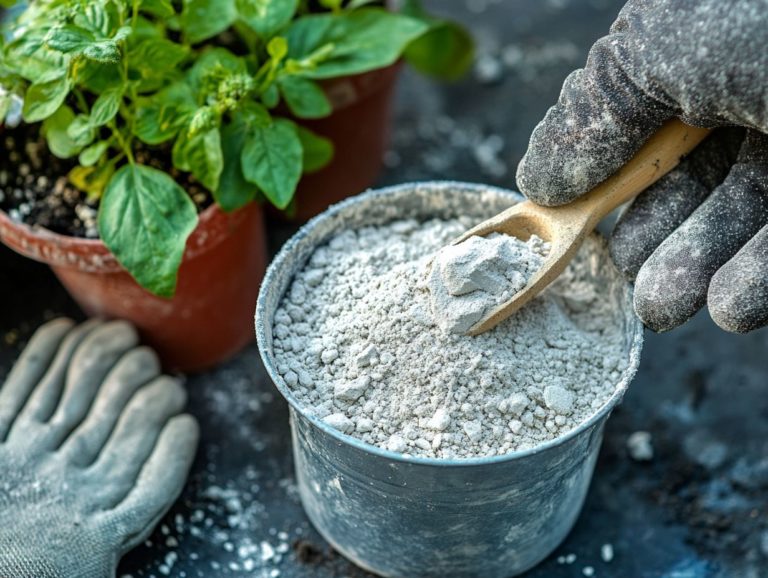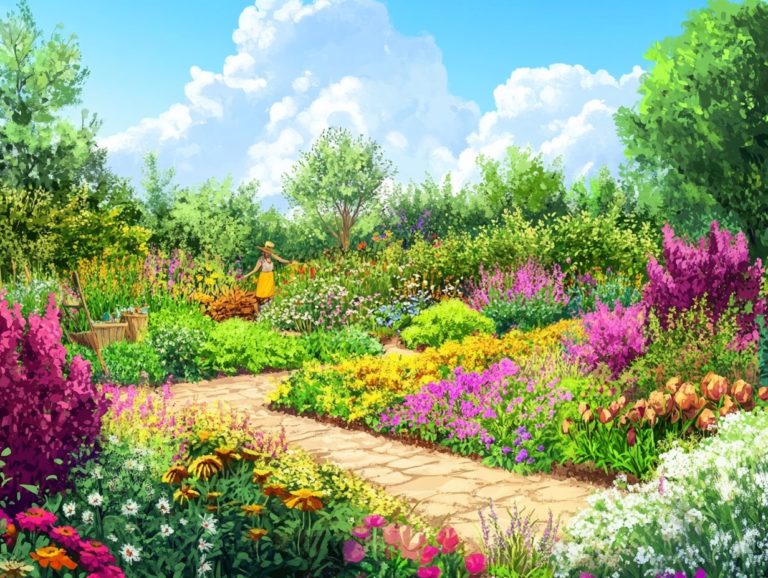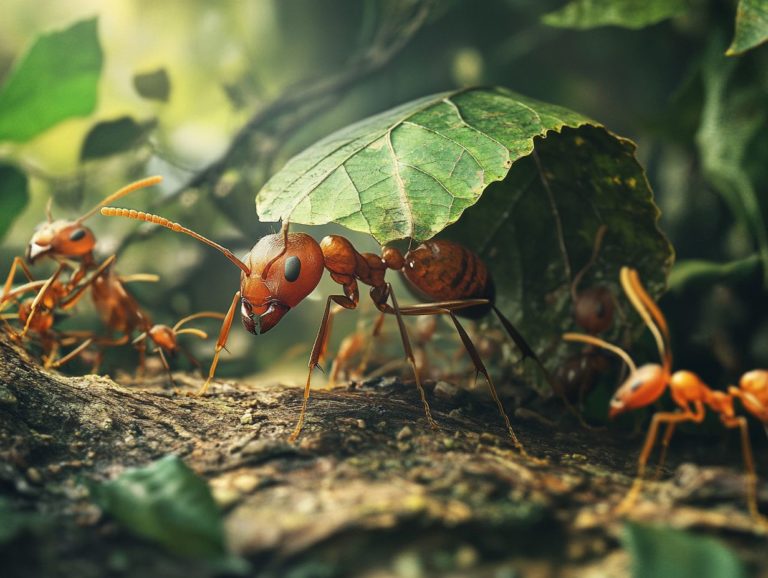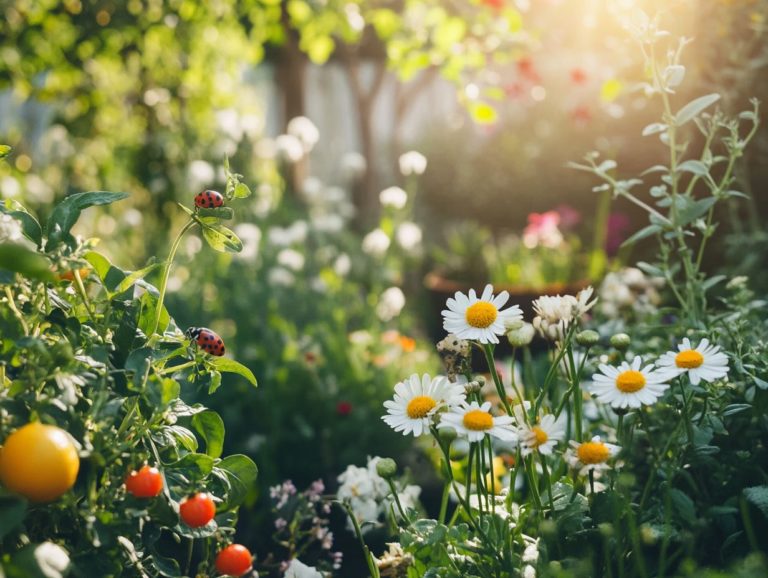Top 5 Pest-Resistant Plants for Your Garden
Are you eager to maintain a flourishing garden without resorting to harsh chemicals and embracing natural pesticides?
Uncover the top five pest resistant plants that not only elevate your garden’s aesthetic but also help keep pesky garden pests at bay.
From the delightful aromatic scents of lavender to the vivid hues of marigolds, these plants provide unique advantages and practical applications.
Delve into what makes each plant effective. Discover how to integrate them seamlessly into your garden using companion planting, which means growing different plants together to benefit each other, and gather essential tips for thriving growth across different climates.
Prepare to nurture a healthier, more vibrant garden, free from the hazards of chemical pesticides!
Contents
- Key Takeaways:
- 1. Lavender
- 2. Marigolds
- 3. Chrysanthemums
- 4. Rosemary
- 5. Basil
- What Makes These Plants Pest-Resistant?
- Frequently Asked Questions
- What are the top 5 pest-resistant plants for my garden, including geraniums and chrysanthemums?
- What makes these plants resistant to pests, including their non-toxic compounds?
- Do these plants require any special care?
- Can these plants be grown in any type of garden?
- Are these plants safe for pets and children?
- Can these plants also be used for cooking or medicinal purposes?
Key Takeaways:
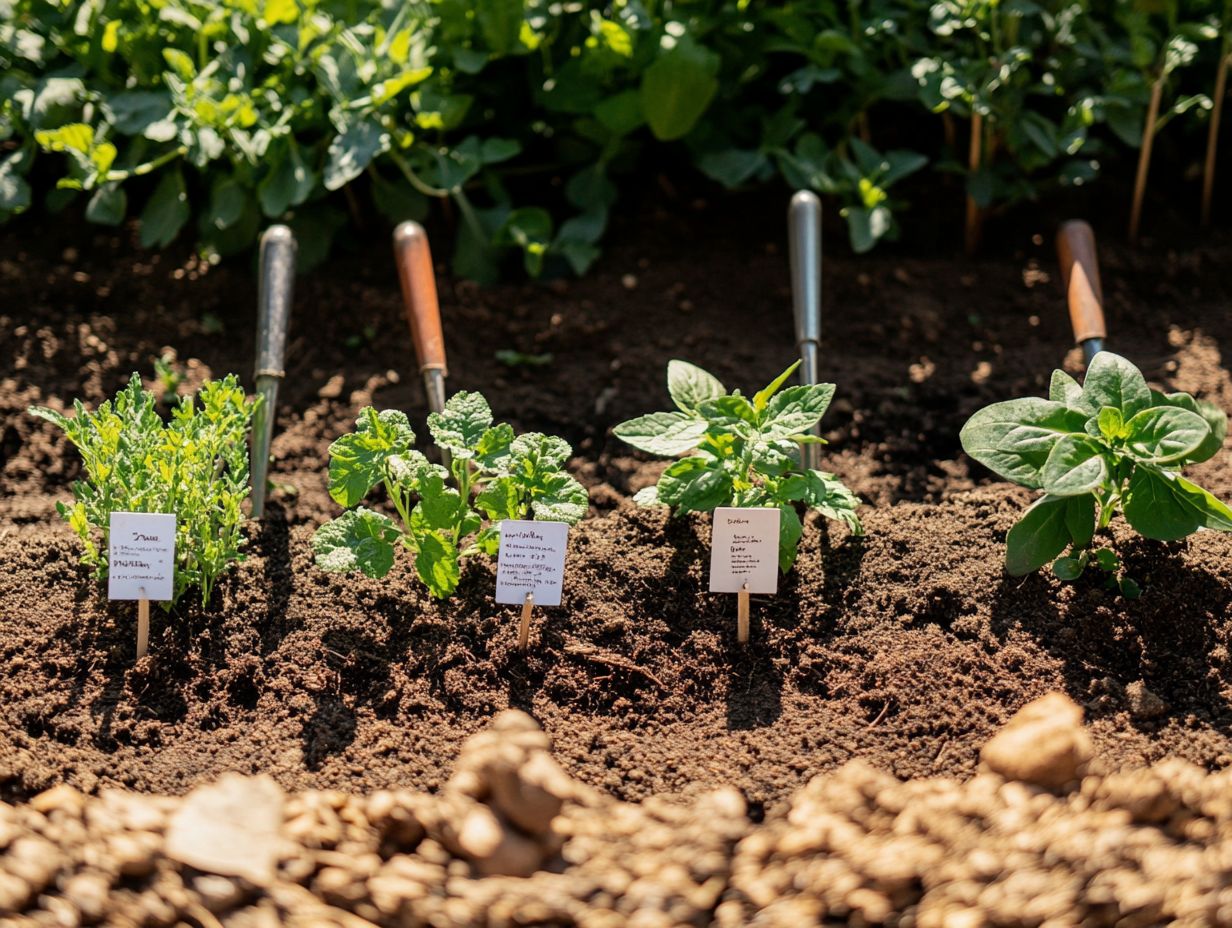
- Lavender, marigolds, chrysanthemums, rosemary, and basil are the top 5 pest resistant plants for your garden.
- These plants naturally repel pests due to their strong scents.
- They also attract pollinators and enhance flavors in dishes.
1. Lavender
Lavender has captivating scents and vibrant blooms. It s not just a beautiful addition to your garden; it s also one of the most effective pest-resistant plants.
By incorporating lavender, you can cultivate a bug-free yard while opting for a natural insect repellent instead of harsh chemical pesticides.
This fragrant herb plays a vital role in companion planting, as its aroma helps deter pesky insects like mosquitoes, fleas, and moths. It s the perfect companion for your vegetables and herbs. Many gardeners have reported remarkable success by strategically placing lavender near plants that tend to attract pests.
If you re considering using lavender oil, remember that when diluted, it can be applied directly to your skin as a natural repellent or sprayed around your home to keep unwanted bugs at a distance.
For those eager to grow their own lavender, visit your local gardening center for expert advice! They can provide guidance on optimal planting conditions, soil types, and watering needs to ensure your lavender garden thrives beautifully.
2. Marigolds
Marigolds are celebrated not just for their vibrant blooms, but also for their remarkable ability to repel pests and serve as pest-repelling flowers, making them an essential addition to any garden striving for a bug-free oasis through natural methods.
These cheerful flowers excel at warding off bothersome insects like aphids, nematodes, and whiteflies, which can wreak havoc on both vegetable and flower crops. By planting marigolds alongside your tomatoes and peppers, you can establish a natural barrier that keeps these unwelcome guests at bay while also fostering healthier plant growth.
Besides their practical benefits, marigolds bring a delightful splash of color and texture to your garden, crafting a visually stunning landscape that attracts both pollinators and curious onlookers. Their low-maintenance nature makes them the perfect choice for anyone looking to enhance their outdoor space while nurturing a healthier ecosystem.
3. Chrysanthemums
Chrysanthemums are not just a feast for the eyes with their stunning colors; they are also invaluable as pest deterrent herbs, offering you a non-toxic compound solution to keep garden pests at bay.
These vibrant blooms contain pyrethrins, natural chemicals found in chrysanthemums that disrupt the nervous systems of insects. This makes them particularly effective against common nuisances like aphids, beetles, and even mosquitoes.
By weaving chrysanthemums into your seasonal garden strategy, you can craft beautiful borders or companion plantings that not only elevate the aesthetic but also serve as a natural barrier against unwanted pests.
The advantages of choosing these plants over chemical pesticides are many. They foster a healthier ecosystem, attract beneficial pollinators, and minimize chemical runoff making them an environmentally friendly choice. This approach allows you to embrace a more sustainable gardening practice while enjoying the dual benefits of beauty and effective pest control.
Start your journey towards a vibrant, chemical-free garden today!
4. Rosemary
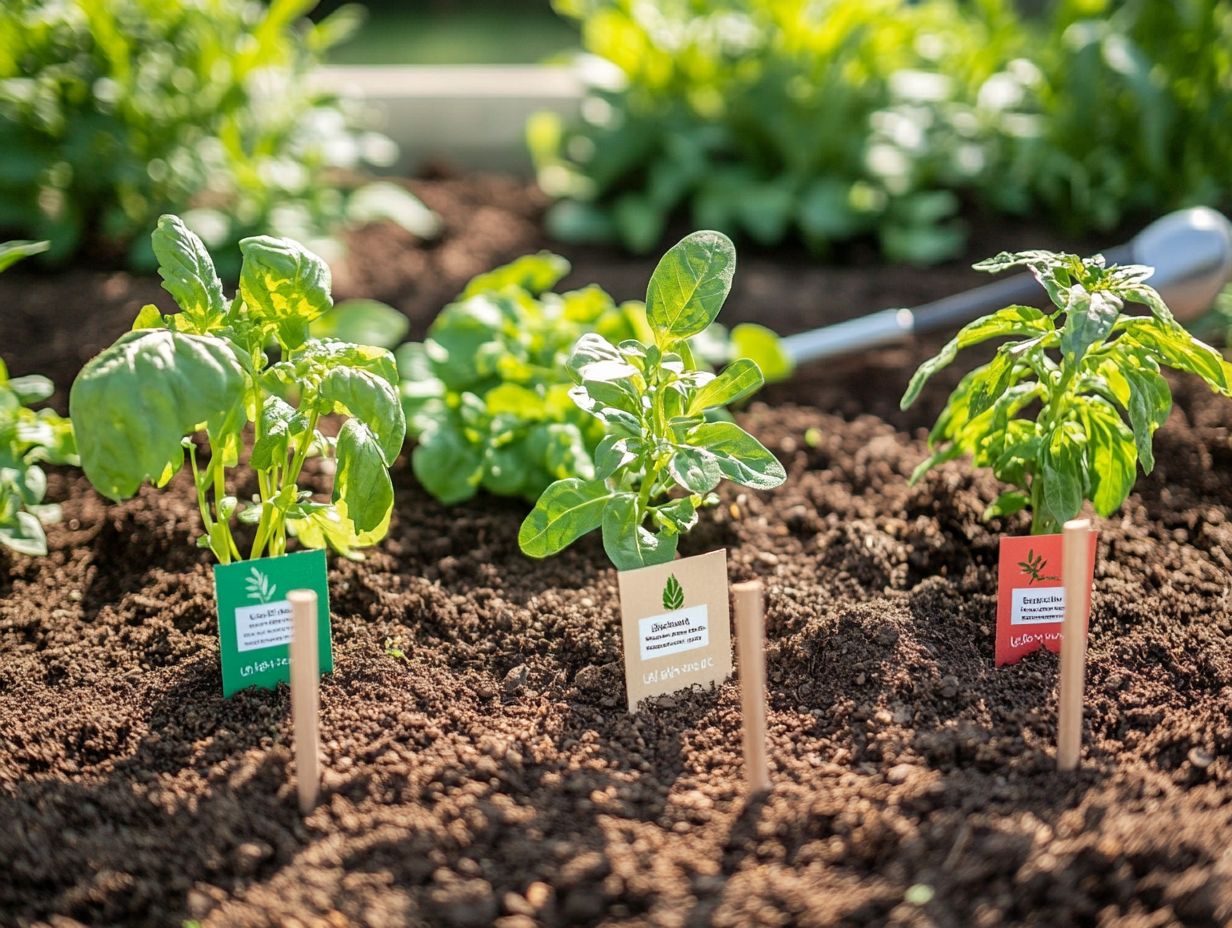
Rosemary is an aromatic herb that’s easy to grow and serves as a natural insect repellent. By adding it to your garden, you can enhance your ways to keep pests away.
This resilient herb grows best in well-drained soil and needs full sun. It s perfect for gardens or pots in warmer climates.
Its fragrant leaves elevate flavors in dishes from roasted meats to savory breads while also repelling insects like mosquitoes and moths. You can enjoy its culinary benefits while keeping unwanted visitors at bay.
Planting rosemary among your other plants creates a perfect barrier against pests. For extra protection, try using rosemary essential oil in your homemade sprays!
5. Basil
Basil comes with delightful aromas and is versatile in cooking. It’s also an effective pest-resistant plant and a natural mosquito repellent.
With varieties like sweet basil, Thai basil, and purple basil, you can enhance your dishes with distinct flavors and scents. This method boosts the health of neighboring plants while acting as a natural deterrent against pests such as aphids and spider mites.
Basil s robust fragrance confuses these pests and reduces their presence in your garden. It also attracts beneficial insects that feast on unwelcome guests.
By incorporating various types of basil, you create a fragrant, vibrant haven that fosters biodiversity and enhances your gardening experience.
What Makes These Plants Pest-Resistant?
The pest-resistant qualities of these plants come from their natural insect-repellent properties. They offer an effective alternative to chemical pesticides, which can harm the environment.
These plants contain specific compounds like essential oils, terpenes, and flavonoids, designed to deter insects while protecting beneficial species. For example, marigolds release a compound called alpha-terthienyl that repels nematodes.
Garlic gives off sulfur compounds that keep aphids and other pests away. Instead of traditional pest control methods that can harm the soil and wildlife, planting these pest-resistant varieties nurtures a balanced ecosystem.
Using these plants enhances the sustainability of your gardening practices. You ll cultivate a healthy soil microbiome that fosters robust plant growth while minimizing the use of chemical pesticides.
How Can These Plants Be Used in the Garden?
Integrating pest-resistant plants into your garden elevates your gardening skills. One method is companion planting, where you group specific plants together to naturally deter pests.
For example, pairing marigolds with tomatoes repels nematodes and promotes tomato health. Imagine tall plants, like sunflowers, providing shade for delicate herbs like basil that thrive under partial shade.
When sourcing these plants, check out local gardening centers for tips on selecting varieties suitable for your climate. Choosing organic seeds or seedlings can amplify the benefits of your pest-resistant garden!
What Other Benefits Do These Plants Offer?
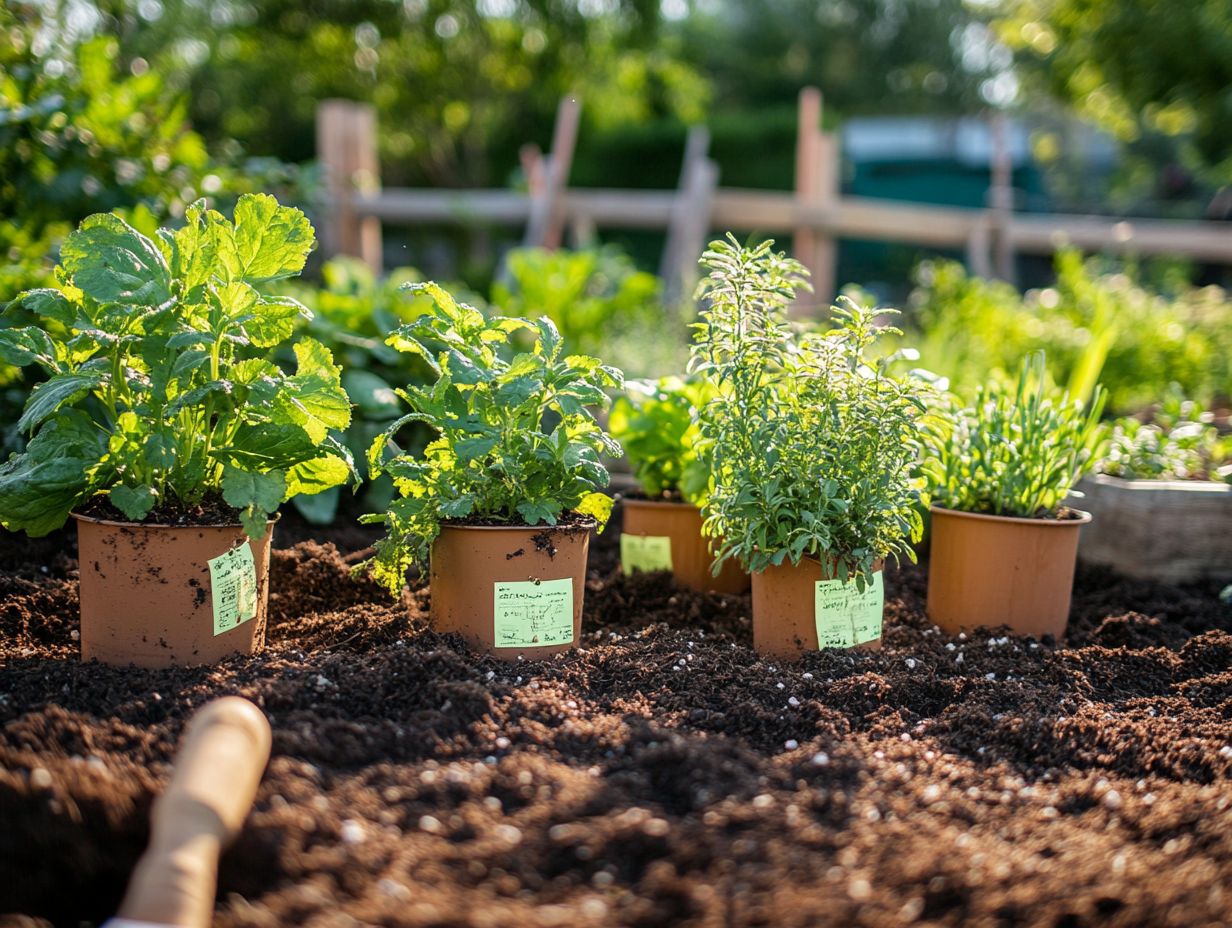
In addition to their impressive pest-repelling abilities, these plants provide many benefits that elevate your garden experience. Their aromatic scents beautify your outdoor space and create an inviting atmosphere.
Their vibrant blooms attract beneficial insects, all without requiring extensive gardening expertise. Colorful petals enhance the visual allure of your garden while fulfilling a vital ecological role by drawing in essential pollinators, like bees and butterflies.
These creatures play a crucial role in keeping our garden lively and productive! By cultivating such diversity, you enrich your garden environment and promote the survival of beneficial wildlife.
Many of these plants are celebrated for their cooking and health benefits, offering a delightful array of flavors and natural remedies. Incorporating these remarkable plants into your garden elevates sustainability and beauty to extraordinary new heights!
Are There Any Precautions to Take When Using These Plants?
Using these plants as natural insect repellents works well, but you ll want to take certain precautions to ensure they thrive and keep seasonal critters at bay in your garden.
Proper care techniques are essential. Maintain adequate soil moisture and ensure they soak up sufficient sunlight for optimal health. Regular pruning encourages growth and prevents overcrowding, which can inadvertently attract unwanted pests.
Keep an eye out for potential challenges like aphids or fungal infections, as these can undermine their effectiveness. When in doubt, consult a local gardening center; their experts can offer tailored advice suited to your specific environmental conditions, helping your plants flourish!
Can These Plants Be Used in Different Climates?
Many pest-resistant plants can thrive in various climates, making them an excellent choice for cultivating a bug-free yard, regardless of environmental conditions.
Understanding how these plants adapt to their surroundings is essential for your gardening success. Take herbs like basil and mint; they not only repel pests, but they also thrive in both warm and temperate climates.
If you’re in a region with cooler temperatures, consider using greenhouses or raised beds to retain heat. Conversely, in areas that experience extreme heat, incorporating shade cloths can be a game-changer.
The effectiveness of these pest-deterrent herbs often depends on local climate conditions. Factors like humidity levels, sunlight, and soil types influence their growth and potency.
By tailoring your gardening strategies to align with your region’s specific climate, you can greatly enhance pest deterrence and nurture a thriving, resilient garden!
Frequently Asked Questions
What are the top 5 pest-resistant plants for my garden, including geraniums and chrysanthemums?
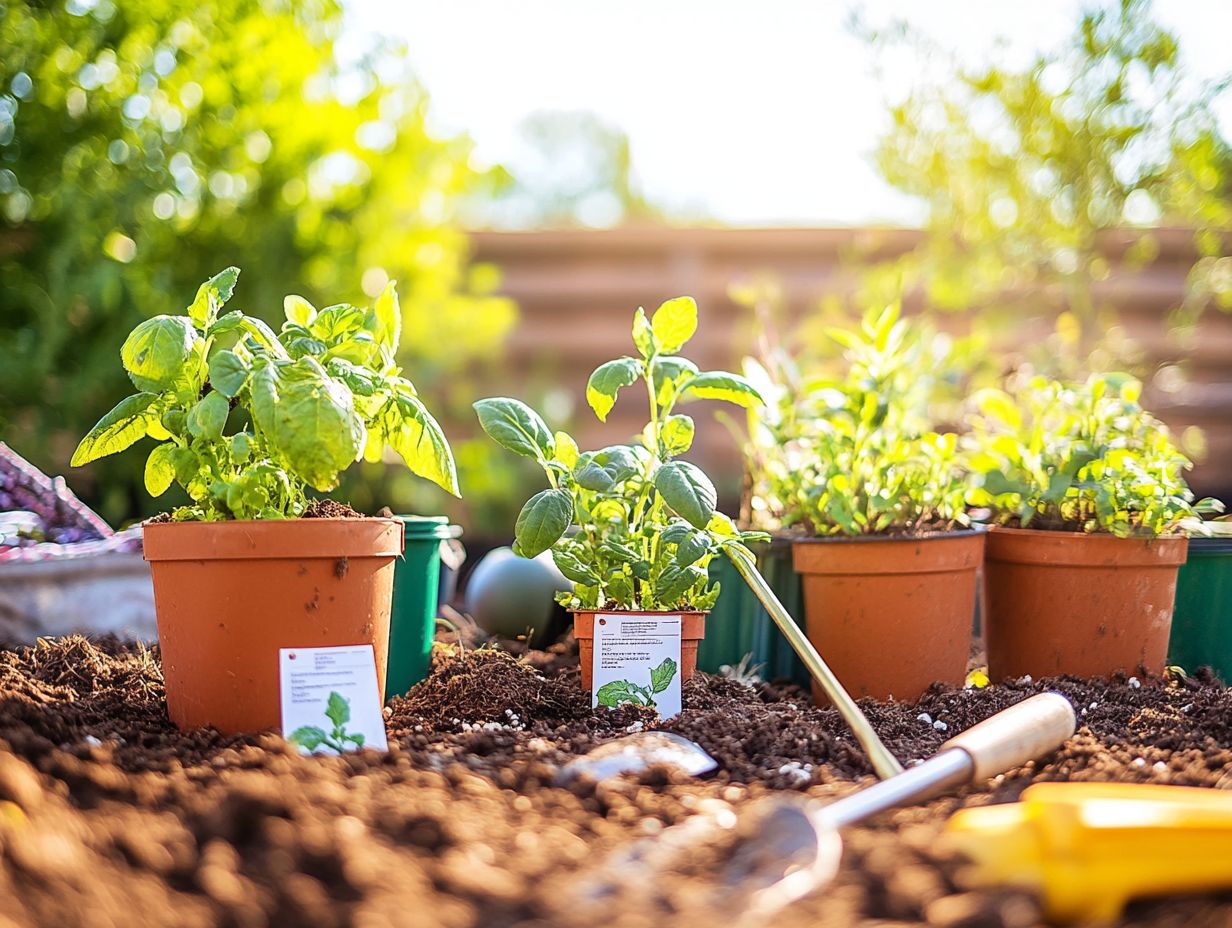
The top 5 pest-resistant plants for your garden are:
- Marigolds
- Lavender
- Basil
- Rosemary
- Chrysanthemums
What makes these plants resistant to pests, including their non-toxic compounds?
These plants contain natural insect-repelling properties, such as strong scents or bitter tastes, making them unappealing to pests.
Do these plants require any special care?
No, these plants are easy to grow and do not require special care. They are low-maintenance and thrive in various conditions.
Can these plants be grown in any type of garden?
Yes, these plants can be grown in both outdoor and indoor gardens. They are versatile and adapt to different environments.
Are these plants safe for pets and children?
Yes, these plants are safe for pets and children. They do not contain any harmful chemicals and are non-toxic.
Can these plants also be used for cooking or medicinal purposes?
Yes, plants like basil and rosemary are great for cooking. They also have medicinal benefits.
Imagine adding fresh basil or rosemary to your meals! These plants not only enhance flavor but can also support your health.
Always research how to use them properly. Consulting a professional is wise before consuming any new plant.


